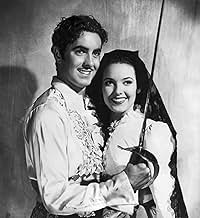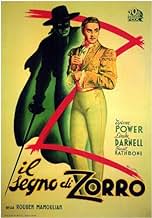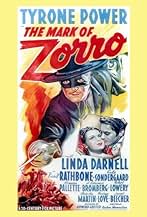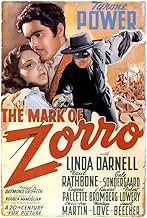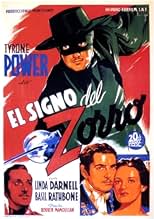Un jeune aristocrate doit prétendre être un dandy pour protéger son identité secrète de Zorro alors qu'il rétablit la justice dans la Californie naissante.Un jeune aristocrate doit prétendre être un dandy pour protéger son identité secrète de Zorro alors qu'il rétablit la justice dans la Californie naissante.Un jeune aristocrate doit prétendre être un dandy pour protéger son identité secrète de Zorro alors qu'il rétablit la justice dans la Californie naissante.
- Nommé pour 1 Oscar
- 1 victoire et 1 nomination au total
- Caballero
- (non crédité)
Histoire
Le saviez-vous
- AnecdotesThe famous duel was staged by Hollywood fencing master Fred Cavens. He specialized in staging duels that relied more on real swordplay rather than the jumping on furniture and leaping from balconies that many film duels incorporated up until that point. Cavens' son, Albert Cavens, doubled for Tyrone Power in the fancier parts of the duel (mostly with his back to camera), such as the extended exchange with Esteban ending with Don Diego's sword smashing into the bookcase. Basil Rathbone, a champion fencer in real life, did not care for the saber (the weapon of choice in this film), but nevertheless did all of his own fencing. Fast fencing shots were under-cranked to 18 or 20 frames per second (as opposed to the standard 24fps) and all the sound effects were post-synchronized.
- GaffesWhen Diego dines with the Quinteros, Inez asks him to show them the new dance steps. He and Lolita then dance together, but somehow the sheltered young Lolita knows the dance perfectly. This doesn't make sense if it contains new dance steps that even society-mad Inez doesn't know.
- Citations
Don Diego Vega: I must please ask you to change the subject. His Excellency objects to talk of throat-cutting.
Captain Esteban Pasquale: Quiet, you Popinjay! I have no reason to letting you live either.
Don Diego Vega: What a pleasant coincidence. I feel exactly the same way about you Capitan.
Captain Esteban Pasquale: You wouldn't care to translate that feeling into action would you?
Don Diego Vega: I might be tempted. If I had a weapon.
Captain Esteban Pasquale: Would you.
- Crédits fousOpening credits prologue: MADRID - when the Spanish Empire encompassed the globe, and young blades were taught the fine and fashionable art of killing ...
- Versions alternativesAlso available in a colorized version.
- ConnexionsEdited into Myra Breckinridge (1970)
Both stars were considered premier swashbucklers of their time, and 1940's THE MARK OF ZORRO introduced Power to the genre dominated by Flynn. Just as Flynn's greatest triumph was a remake of an earlier Douglas Fairbanks classic (1922's ROBIN HOOD), Power's best-loved swashbuckler had first been a Fairbanks favorite, as well (1920's THE MARK OF ZORRO). As Don Diego de Vega, a cadet at 'the Academy' in Madrid who puts his gift with the sword to good use in an oppressed California, when recalled home by his father, he quickly adopts an effeminate persona (a la THE SCARLET PIMPERNEL), to mask his true ability and plans. While the charade infuriates his father ("My son has become a PUPPY!" he laments, at a time when the word 'homosexual' was not used), the guise helps the younger Vega worm his way into the confidence of the corrupt yet cowardly current Alcalde (the venerable J. Edward Bromberg) and his socially-conscious wife (Gale Sondergaard). Less 'taken in' is the true villain of the film, military commander Captain Esteban Pasquale (superbly portrayed by frequent Flynn nemesis Basil Rathbone), who sneers at the Alcalde's plan to marry Vega off to his niece, Lolita (the ravishing Linda Darnell), to quell local unrest; when Vega claims tardiness for the engagement dinner because of his bath water becoming 'tepid', Pasquale comments, "Just as I fear poor Lolita's future married life shall be."
The on-screen chemistry between Power and Darnell is terrific (a key scene, with Vega/Zorro disguised as a priest, as Lolita confesses her secret desires, would be 'spiced up' and recreated in the Banderas/Zeta-Jones 1998 update, THE MASK OF ZORRO). As the only other person who knows Zorro's real identity, Fray Felipe (Eugene Pallette, playing a role very similar to his 'Friar Tuck' in Flynn's ROBIN HOOD) has some of the film's wittiest dialog, and gets to show his swordsmanship in a brief duel with Pasquale ("You should have been a soldier", the captain comments, after disarming him).
If the film has a fault, it is that the Power/Rathbone climactic duel occurs too early. Staged by Errol Flynn's fencing master, Fred Cavens, the action is spectacular, confined to a single room, yet with Pasquale's death, the film loses it's most potent villain, and the final large-scale fight between the Alcalde's forces and the peons and gentry lacks the focus of the climax of THE ADVENTURES OF ROBIN HOOD.
Directed with tongue-in-cheek by veteran film maker Rouben Mamoulian, and with an Oscar-nominated score by Fox's musical mainstay, Alfred Newman, THE MARK OF ZORRO was a major studio hit (plans for a sequel were begun, but dropped when it was discovered that Fox only had the rights to the title, THE MARK OF ZORRO; the name 'Zorro' belonged to another studio, ending any possibility of a follow-up).
Tyrone Power had joined Errol Flynn as the reigning 'kings' of swashbucklers, a title both would find amusing, if limiting, but which would be how both actors are best remembered, today!
Meilleurs choix
Détails
- Date de sortie
- Pays d’origine
- Langues
- Aussi connu sous le nom de
- The Mark of Zorro
- Lieux de tournage
- Société de production
- Voir plus de crédits d'entreprise sur IMDbPro
Box-office
- Budget
- 1 000 000 $US (estimé)
- Montant brut mondial
- 10 248 $US
- Durée1 heure 34 minutes
- Couleur
- Rapport de forme
- 1.37 : 1
Contribuer à cette page


